Managing HR tasks manually can be time-consuming and error-prone for small businesses. This article explores the best HR software for small businesses in 2025, detailing their key features, pricing, and benefits. Whether you need payroll automation, compliance management, or employee self-service tools, this guide will help you find the right solution. Compare top options like BambooHR, Gusto, Zoho People, Rippling, and more to streamline HR operations and support business growth.
"Time is money," — the old saying still goes on, and nowhere is it more accurate than in small businesses. Did you know that nearly 45% of small business owners spend at least one full day monthly on HR-related tasks alone? That's 12 days a year that is lost to payroll, compliance, and paperwork. The time could be better spent growing your business, innovating, or connecting with customers.
For small businesses, every minute counts. Yet, many continue to rely on outdated, manual HR processes that drain resources and increase the risk of errors. Have you ever thought of a tool that could save time, ensure compliance, improve employee satisfaction, and scale your business as it grows? That tool exists—it's called HR software.
This guide will explore HR software for small businesses, its benefits, and how to choose the best solution for your unique needs.
Whether you're a small business owner, an HR manager, or a decision-maker in a growing company, this article will equip you with the knowledge to make a worthy decision.
Let's get started!
HR software is a digital solution designed to manage, automate, and optimize human resources functions such as payroll, hiring, compliance, and employee performance.
Small business HR software is often more affordable, user-friendly, and tailored to meet the needs of smaller teams.
1. HRMS (Human Resource Management System) –
Comprehensive HR management covering payroll, benefits, and compliance.
2. HCM (Human Capital Management) –
Focuses on employee development, workforce planning, and talent management.
3. HRIS (Human Resources Information System) –
Centralized employee data storage and compliance tracking.
Small businesses often operate with smaller or fresh teams, which makes manual HR processes a significant burden—the manual payroll processing, attendance tracking, and employee record-keeping waste valuable time.
Also, discussing compliance risks and keeping up with ever-changing labor laws can be daunting. Plus, spreadsheets and paper-based systems can sometimes be nightmares and prone to inefficiencies.
So, what does small business HR software do? It automates repetitive tasks, freeing up time for strategic activities. Plus, it reduces errors in payroll and compliance reporting. The self-service portals empower employees to manage their data.
|
Pro Tip: 94% of employees say they are more likely to stay with a company that invests in their development and well-being. |
| Feature | Why It Matters |
| Payroll & Compliance | Automates salary processing and tax filings. |
| Time & Attendance Tracking | Ensures accurate payroll and prevents buddy punching. |
| Recruitment & Onboarding | Speeds up hiring and improves candidate experience. |
| Employee Self-Service | Empowers employees to manage personal data. |
| Performance Management | Helps track employee growth and set performance goals. |
| HR Analytics & Reporting | Provides insights for strategic decision-making. |
Choosing the right HR software for small business is a critical decision that significantly impacts your business's efficiency and growth. There are so many options available that the selection process will be methodical.
Before diving into the sea of HR software options, take a step back and evaluate your business's requirements. Start by identifying your pain points, such as
Struggling with payroll errors?
Is employee attendance tracking eating up too much time?
Do you need better tools for recruitment and onboarding?
Create a list of must-have features based on your priorities. For example:
If compliance is a concern, prioritize software with robust compliance management tools.
If you're scaling quickly, look for solutions with strong recruitment and onboarding features.
If your team is remote or hybrid, ensure the software offers mobile accessibility and remote work tools.
By understanding your needs, you can narrow your options and focus on solutions that address your challenges.
Budget is a key consideration for small businesses, so it is essential to understand the pricing structures of different HR software solutions. Most providers offer subscription-based plans, which can be monthly or annual.
Some may also offer tiered pricing based on the number of employees or features included.
Here's what to look for when comparing pricing:
Does the provider clearly outline what's included in each plan?
Are there options to upgrade as your business grows?
Are there extra charges for features like advanced reporting or customer support?
Don't just go for the cheapest option; consider the value you're getting for your money. A slightly higher upfront cost might save you time and resources in the long run.
The small business HR software is only effective if your team uses it efficiently. A user-friendly interface is essential, especially for small businesses without dedicated IT support.
Look for software that offers:
Intuitive navigation and straightforward menus.
Minimal training requirements for employees.
Mobile-friendly designs for on-the-go access.
Many providers offer free trials or demos—take advantage of these to test the software's usability.
Ask yourself:
Is the dashboard easy to understand?
Can employees quickly find the information they need?
How long does completing everyday tasks like payroll or leave requests take?
Ease of use directly impacts adoption rates, so choose a solution your team will use.
Your business is growing, and your HR software should grow with it. Scalability is a critical factor that you should consider, especially if you plan to expand your team or operations soon.
Ask potential providers:
Can the software handle an increasing number of employees?
Are there additional features or modules you can add as needed?
How easy is it to upgrade to a higher-tier plan?
Scalable software ensures that you won't outgrow your HR solution and will save you from the hassle of switching systems.
Finally, don't rely solely on marketing materials; seek real-world feedback from other small businesses. Online reviews on TechnologyCounter, G2, and Capterra can provide valuable insights into a software's strengths and weaknesses.
When reading reviews, pay attention to the following:
Are users satisfied with the provider's responsiveness and expertise?
Does the software perform consistently without glitches?
How smooth was the onboarding process?
Once you've shortlisted a few options, request demos or free trials. It will give you a feel for the software's functionality and whether it aligns with your needs.
Learn more about the major functions of an HR manager to ensure your software covers essential HR tasks.
Here’s a comparison of the best HR software options for small businesses.
| Software | Key Features | Pricing |
| Zoho People | Attendance tracking, performance management, HR analytics | Starts at $1/employee |
| BambooHR | Payroll, time tracking, performance management, employee self-service | Starts at $6/employee |
| Gusto | Payroll, benefits administration, compliance management | Starts at $39/month |
| Paycor | Recruitment, onboarding, payroll, time tracking | Custom pricing |
| Rippling | Payroll, benefits, IT management, employee onboarding | Starts at $8/employee |
| Zenefits | Payroll, benefits, time tracking, compliance management | Starts at $8/employee |
| ADP Workforce Now | Payroll, HR management, talent management, benefits administration | Custom pricing |
| Namely | Payroll, performance management, time tracking, compliance | Custom pricing |
| Sage HR | Leave management, performance tracking, recruitment, HR reporting | Starts at $5.50/employee |
| Freshteam | Recruitment, onboarding, time-off management, employee database | Free for up to 50 employees |
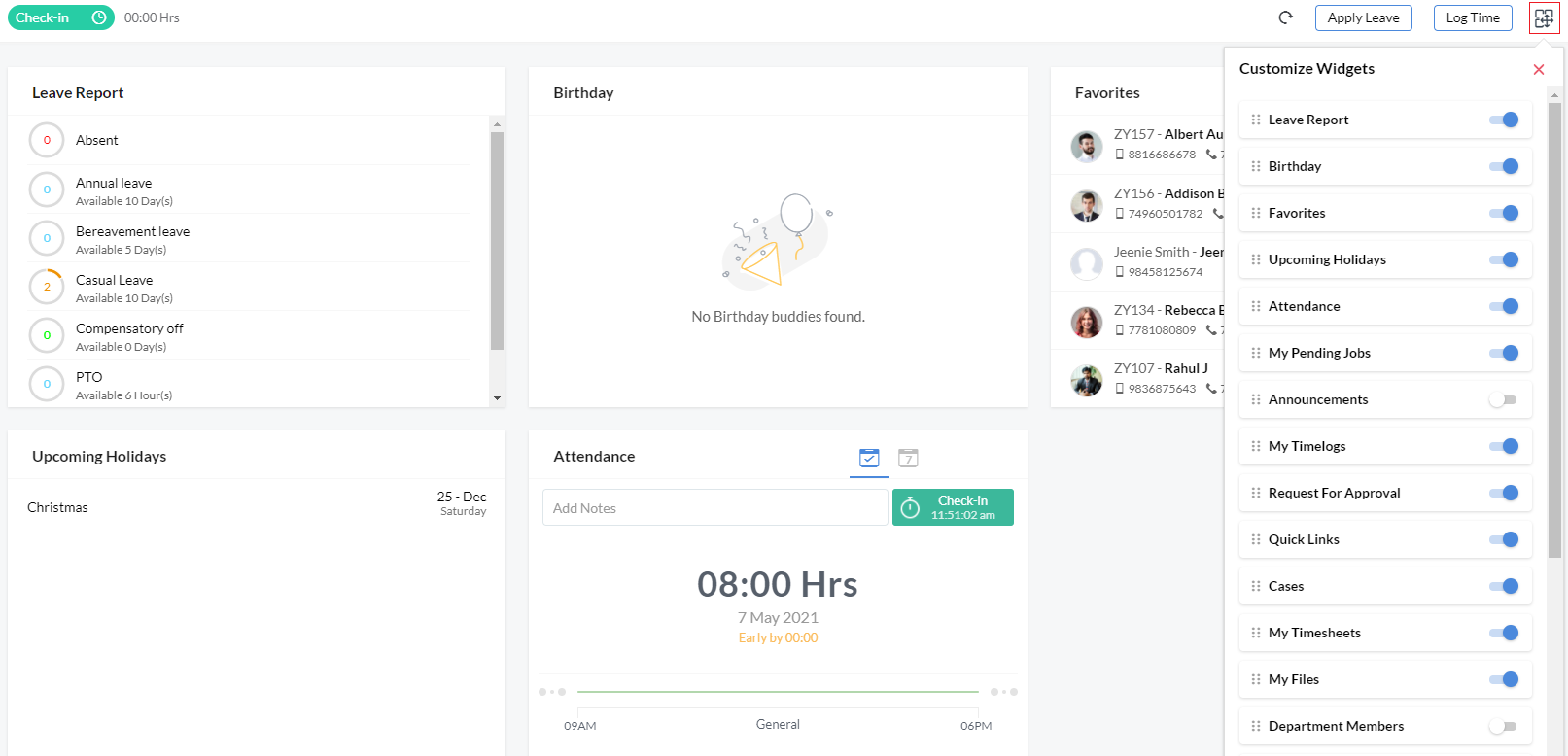
Zoho People is an affordable HR software that integrates seamlessly with other Zoho applications, that makes it ideal for businesses already in the Zoho ecosystem.
Best For: Budget-conscious businesses already using Zoho's suite of tools.
Key Features:
Attendance tracking and leave management.
Performance appraisal tools.
HR analytics and reporting.
Employee self-service portal.
Pricing:
| Plan Name | Pricing (Per Employee/Month) | Features Included |
| Essential HR | $1 | Employee database, leave management |
| Professional | $2 | Attendance tracking, shift scheduling |
| Premium | $3 | Advanced analytics, performance tracking |
| Enterprise | $5 | Custom automation, AI-driven HR insights |
| People Plus | $10 | Includes full Zoho suite for HR |
Pros:
Affordable pricing for small teams.
Integrates well with other Zoho apps.
Easy-to-use interface.
Cons:
Limited third-party integrations.
Basic payroll features.
BambooHR is a popular choice for small businesses due to its user-friendly interface and robust feature set. It simplifies HR tasks like employee data management, payroll, and performance tracking.
Best For: Small businesses seeking an intuitive, all-in-one HR solution.
Key Features:
Employee self-service portals for easy access to pay stubs and personal information.
Time-off tracking and scheduling tools.
Performance management with goal-setting and feedback tools.
Mobile app for on-the-go HR management.
Pricing:
| Plan Name | Pricing | Features Included |
| Core Plan | Starts at $6 per employee/month | Basic HR tools, employee self-service, time tracking |
| Advanced Plan | Starts at $8 per employee/month | Includes all Core features + performance management, custom workflows |
Pros:
Extremely user-friendly and easy to set up.
Excellent customer support with a dedicated HR advisor.
Customizable workflows and reporting.
Cons:
Limited payroll features compared to competitors.
Advanced features like analytics require a higher-tier plan.
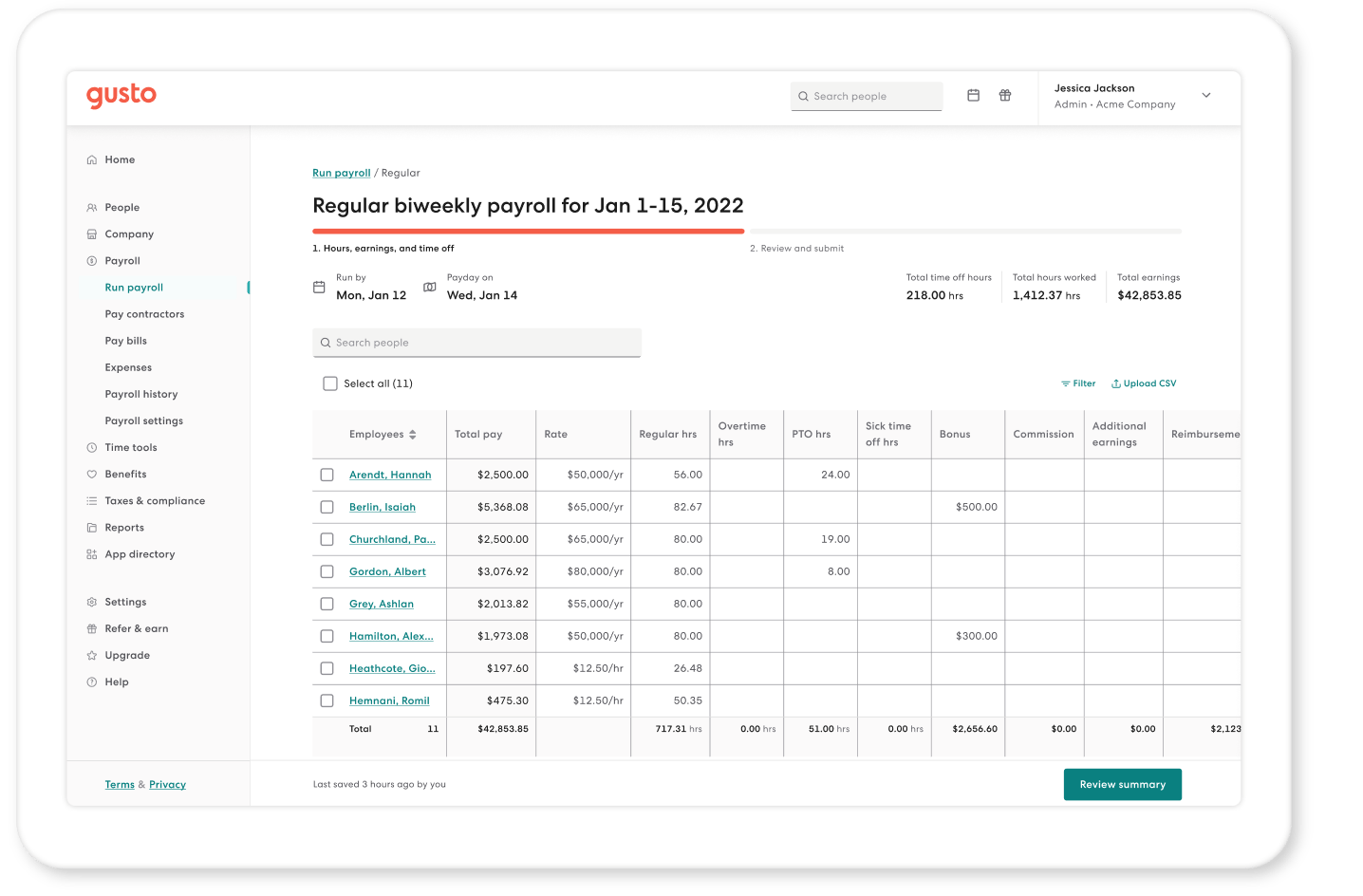
Gusto is a payroll-first HR platform simplifying payroll processing, tax filings, and benefits management. It's particularly popular among startups and small businesses.
Key Features:
Automated payroll and tax filings.
Employee benefits administration (health insurance, 401(k), etc.).
Time tracking and PTO management.
Compliance support for federal and state regulations.
Pricing:
| Plan Name | Base Price | Per Employee Cost | Features Included |
| Simple | $40/month | $6 per employee/month | Payroll, tax filings, basic HR tools |
| Plus | $80/month | $12 per employee/month | Full-service payroll, benefits, time tracking |
| Premium | Custom Pricing | Custom Pricing | Advanced HR features, compliance tools |
| Contractor Only | $0 | $6 per contractor/month | Contractor payments only, no base fee |
Pros:
Seamless payroll and benefits integration.
Affordable pricing for small teams.
Excellent onboarding tools for new hires.
Cons:
Limited HR features outside of payroll and benefits.
Higher pricing for advanced features.
Paycor is a comprehensive HR platform designed for small to mid-sized businesses. It offers robust recruitment, onboarding, payroll, and performance management system.
Best For: Growing businesses needing scalable HR solutions.
Key Features:
Recruitment and applicant tracking system.
Onboarding tools for new hires.
Payroll and tax compliance.
Time and attendance tracking.
Pricing:
| Plan Name | Pricing | Features Included |
| Basic | Custom | Payroll, tax filing |
| Growth | Custom | Onboarding, performance management |
| Enterprise | Custom | Full HR suite with automation |
Pros:
Scalable for growing businesses.
Strong recruitment and onboarding features.
Excellent customer support.
Cons:
Expensive for very small businesses.
Pricing is not transparent.
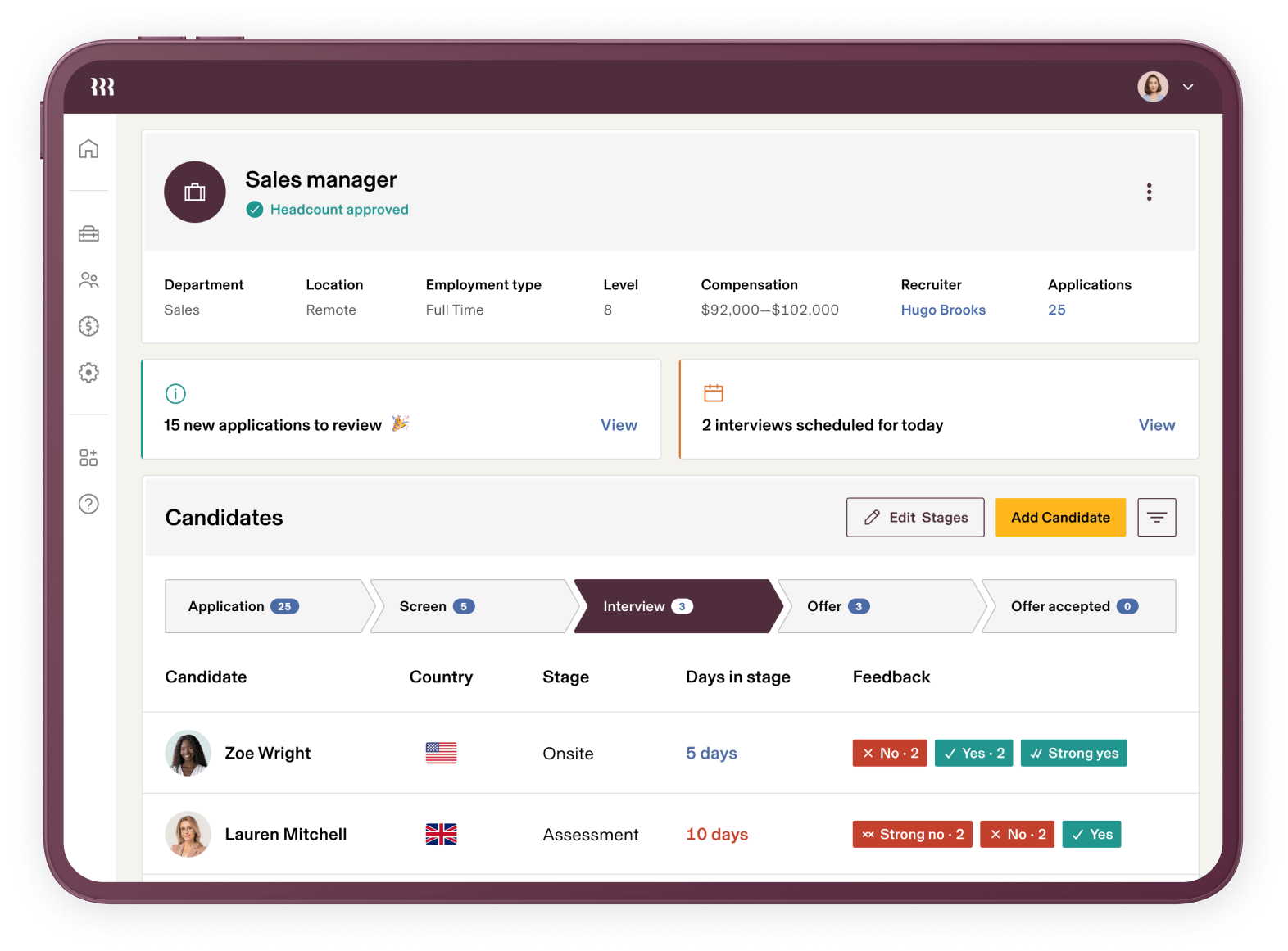
Rippling combines HR, payroll, and IT management into a single platform, making it a versatile choice for businesses with diverse needs.
Best For: Businesses looking for an all-in-one HR and IT solution.
Key Features:
Payroll and benefits administration.
IT management for employee devices and software.
Onboarding and offboarding tools.
Time and attendance tracking.
Pricing:
| Plan Name | Pricing | Features Included |
| Core HR Platform | Starts at $8 per employee/month | Basic HR management, payroll |
| Add-ons | Varies | Benefits, IT device management, compliance |
Pros:
All-in-one solution for HR and IT.
Highly customizable.
Easy-to-use interface.
Cons:
Steeper learning curve due to advanced features.
Pricing can add up with additional modules.
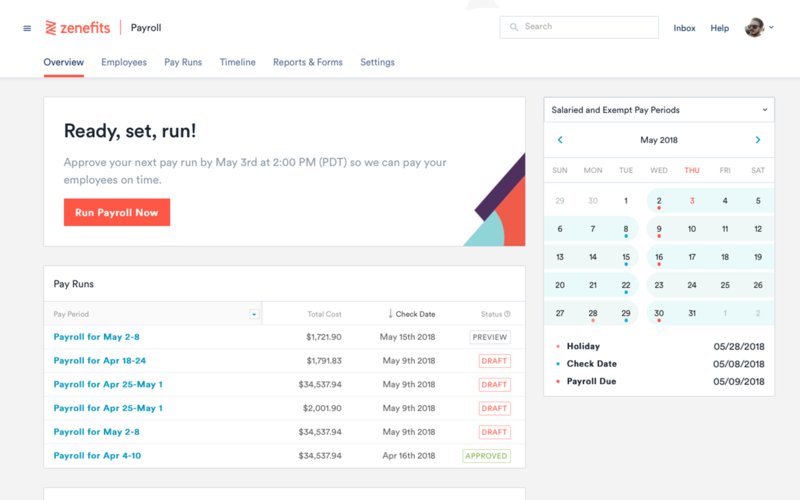
Zenefits is a cloud-based HR platform that offers payroll, benefits, and compliance tools at an affordable price.
Best For: Startups and small businesses needing affordable HR solutions.
Key Features:
Payroll and benefits administration.
Time tracking and scheduling.
Compliance management.
Employee self-service portal.
Pricing:
| Plan Name | Pricing (Per Employee/Month) | Features Included |
| Essentials | $8 | HR, time tracking, integrations |
| Growth | $16 | Compensation tools, performance management |
| Zen | $27 | Full HR automation, compliance suite |
| Payroll Add-on | +$6 | Payroll processing |
Pros:
Affordable pricing for startups.
Easy-to-use interface.
Strong payroll and benefits tools.
Cons:
Customer support can be slow.
Limited advanced HR features.
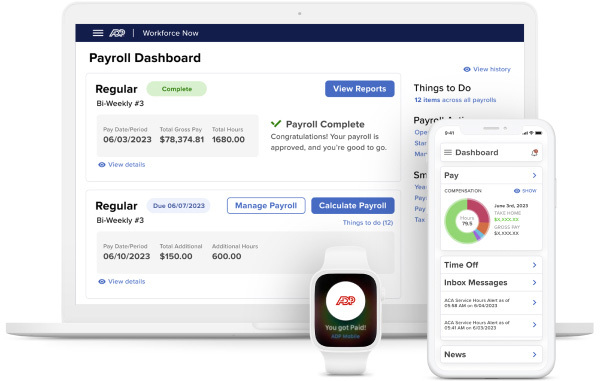
ADP Workforce Now is a robust HR platform designed for growing businesses. It offers advanced tools for payroll, talent management, and benefits administration.
Best For: Businesses planning rapid growth and needing robust features.
Key Features:
Payroll and tax compliance.
Talent management and recruitment tools.
Benefits administration.
HR analytics and reporting.
Pricing:
| Plan Name | Pricing | Features Included |
| Small Business Plan | Custom | Payroll, tax, compliance |
| Mid-Sized Plan | Custom | Benefits, analytics, workforce planning |
| Enterprise Plan | Custom | Advanced HR automation |
Pros:
Scalable for large and growing businesses.
Robust features for payroll and talent management.
Excellent customer support.
Cons:
Expensive for small teams.
Complex setup process.
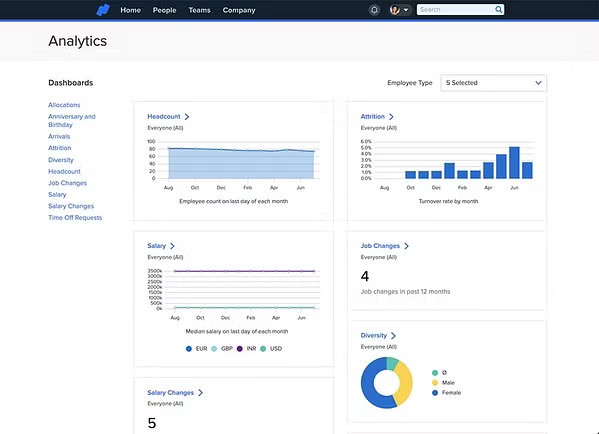
Namely is a modern HR platform that combines payroll, benefits, and performance management in one solution.
Key Features:
Payroll and tax compliance.
Performance management tools.
Time and attendance tracking.
Employee self-service portal.
Pricing:
| Plan Name | Pricing | Features Included |
| Core HR & Payroll | Custom | Payroll, benefits, time tracking |
| Advanced HR Suite | Custom | Compliance, reporting, analytics |
Pros:
User-friendly interface.
Strong compliance tools.
Modern design and features.
Cons:
Pricing is not transparent.
Limited third-party integrations.
Sage HR is a budget-friendly HR software offering essential leave management tools, performance tracking, and recruitment tools.
Best For: Small businesses needing basic HR features at an affordable price.
Key Features:
Leave management and time-off tracking.
Performance appraisal tools.
Recruitment and onboarding tools.
HR reporting and analytics.
Pricing:
| Plan Name | Pricing (Per Employee/Month) | Features Included |
| Core | $6 | Leave tracking, reporting |
| Add-ons | Varies | Recruitment, timesheets, performance reviews |
Pros:
Affordable pricing.
Easy-to-use interface.
Great for small teams.
Cons:
Limited payroll features.
Basic functionality compared to competitors.
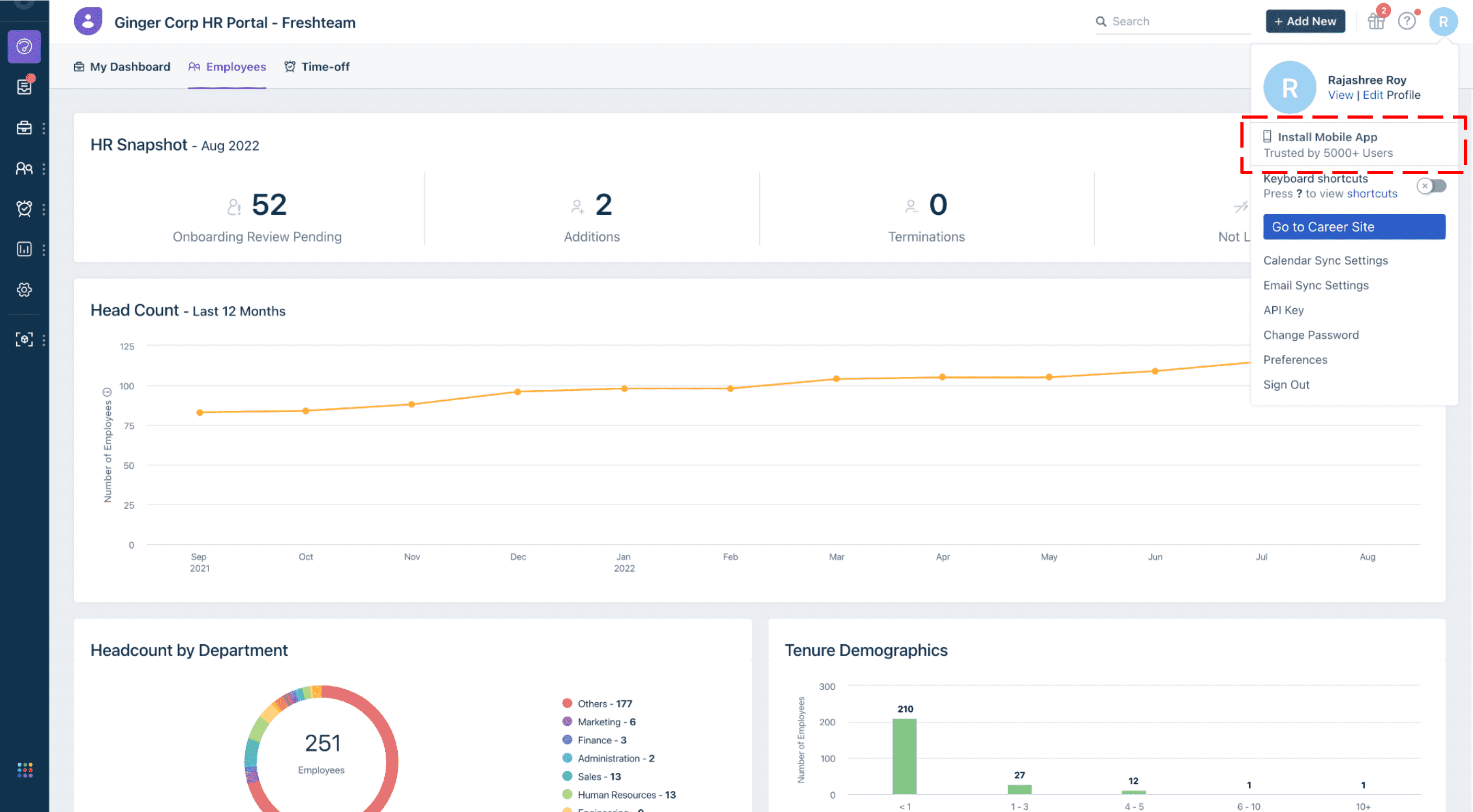
Freshteam is an HR software designed to streamline recruitment and onboarding processes. It offers a free tier for small teams, making it an attractive option for startups.
Key Features:
Recruitment and applicant tracking system (ATS).
Onboarding tools for new hires.
Time-off management.
Employee database.
Pricing:
| Plan Name | Pricing (Per Employee/Month) | Features Included |
| Free | $0 (for up to 50 employees) | Basic HR tools, applicant tracking |
| Growth | $1 | Employee records, time-off management |
| Pro | $2 | Advanced recruitment, interview scheduling |
| Enterprise | $5 | Compliance, advanced automation |
Pros:
Free tier for small teams.
Great for recruitment and onboarding.
Affordable pricing.
Cons:
Limited HR and payroll features.
It is not ideal for businesses needing advanced HR tools.
Explore our complete HR software category to find more solutions tailored to your business needs.
Implementing HR software is an important step toward streamlining business operations but requires careful planning and execution. With a structured approach, businesses can ensure a smooth transition, minimize disruptions, and maximize software efficiency.
Train HR Staff & Employees –
Conduct thorough onboarding sessions to ensure all users understand the system's functionalities and best practices.
Migrate Data Carefully –
Ensure accuracy while transferring employee records, payroll data, and compliance documents to avoid errors and discrepancies.
Test the System –
Run a trial phase where HR teams simulate common HR processes (e.g., payroll, hiring) before full implementation to identify potential issues.
Regularly Optimize Usage –
Continuously update the software, monitor user feedback, and provide ongoing training to maximize efficiency and leverage new features.
Small businesses often struggle with manual HR tasks, compliance issues, and inefficient processes. Check out our guide on Top HR challenges and how to overcome them to understand key pain points and solutions.
Investing in the right small business HR software can transform how you manage your small business. The benefits are undeniable, from saving time on administrative tasks to ensuring compliance and boosting employee engagement.
Ready to take the next step? Start by exploring the top HR software solutions mentioned above, and don't hesitate to request a demo or free trial. Your business—and your employees—will thank you.

Prem Chaurasiya is a senior digital marketing executive with a proven track record in driving brand growth and online engagement. With expertise in SEO, social media, content writing, and analytics, Prem develops data-driven strategies that deliver measurable results. Passionate about staying ahead in the digital landscape, Prem is dedicated to maximizing ROI and fostering long-term success.

Subscribe & get all related Blog notification.
Easily find the ideal software for your business with our extensive software database.
Explore Software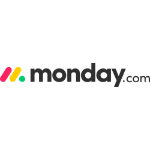
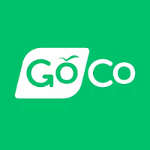
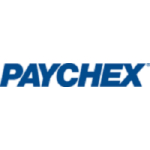

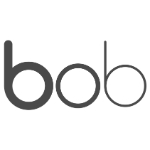
Post your comment